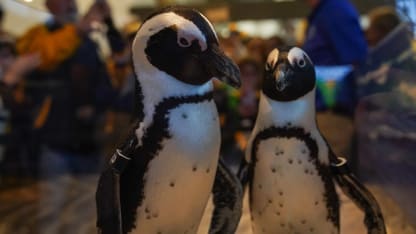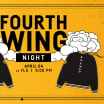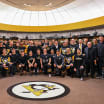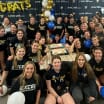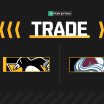This Friday was World Penguin Day, which also marked two years since the launch of the Penguins Pledge. It serves as the organization's commitment to improve all efforts of social, economic, and environmental sustainability. It is a collaborative effort with key partners, including the National Aviary.
As part of that unique relationship, Aviary experts and some of their live penguin ambassadors visit PPG Paints Arena for select home games.
“People are excited about hockey, but also, because of the Pittsburgh Penguins mascot being Iceburgh and a penguin, people are really interested in penguins,” said Cathy Schlott, Director of Animal Programs and Experiences with the National Aviary. “I mean, how can you not love a penguin?”
That sentiment was echoed by fans waiting in the long line ahead of Pittsburgh’s season finale against Washington, who stopped by to take photos and learn more through TV screens at the exhibit, which shared facts and additional resources.
Getting the penguins to the arena is a very strategic process. The animal expert team selects from a group of penguins they know enjoy watching people and are interested in being in different environments. That ensures the penguins brought onto the crowded concourse are not only comfortable in the environment, but also enjoy it.
The National Aviary always assigns each penguin a dedicated trainer to closely monitor their behavior and be on hand to provide anything they might need in such an environment.
“In anything that we do, we have our animals' comfort as our topmost priority,” Schlott said. “So, we worked with the Pittsburgh Penguins to set up a little mobile habitat in an area where nobody is walking behind them, and where they are very comfortable. We have everything set up so that hockey fans can come and see the penguins, but the penguins are also very comfortable, and can people watch.”
Two penguins who you can often find at Penguins games are Disco (named after 2009 Stanley Cup Champion head coach Dan Bylsma) and Sunshine.
“Disco and Sunshine, they like to people watch, listen to music, and do different things, so they are really the perfect penguins to go to that environment. They go a lot,” Schlott said.
Having the penguins in the arena to be seen in person helps strengthen people’s connection with the animal, something that can really drive them to make a difference.
“My favorite part about my job is really to create these connections between people and the animals,” Schlott said. “When you hear about an animal or see it on TV, a lot of the time that’s not enough to really create an emotional connection. So, for me, it’s all about people being excited to see them. I know if they’re excited to see them, they’re going to want to learn more about them, and they’re also going to learn how to become a partner with us to protect them.”
Forming those emotional connections is more important now than ever before. African penguins were recently uplisted by the International Union for the Conservation of Nature to critically endangered.
“If we want to be able to have these amazing animals for the future, then people need to learn about what they can do to help protect them,” Schlott said. “Unfortunately, the African penguin, if we don’t do anything, could be functionally extinct in the wild by the year 2035.”
Many of the issues faced by African penguins are due to human actions, such as overfishing and disturbing nesting sites, two stressors that the National Aviary aims to spread awareness about.
“Penguins eat fish, they need fish to survive,” Schlott said. “One of the biggest things that is happening to the African penguin and other animals is that humans also love to eat fish. We, though, can fish the fish at a much higher rate than an African penguin can, so what’s happening is we are sometimes fishing fish into extinction.”
A simple fix that can be made in people’s daily lives to still enjoy seafood, while being conscious of penguins and other wildlife, is choosing to eat sustainable seafood.
“There’s a website that you can go to,” Schlott said. “It’s very easy, they break down what the best seafood choices are, what’s okay, and what to avoid. By just picking fish that are in the best or okay category, we can help protect African penguins. It’s a very simple change that people all over the world can make.”

